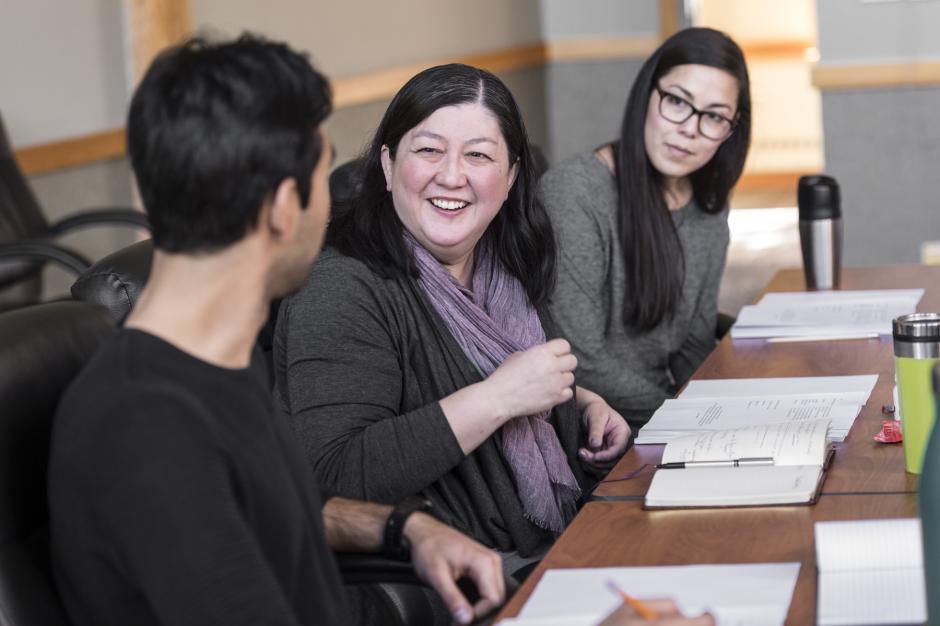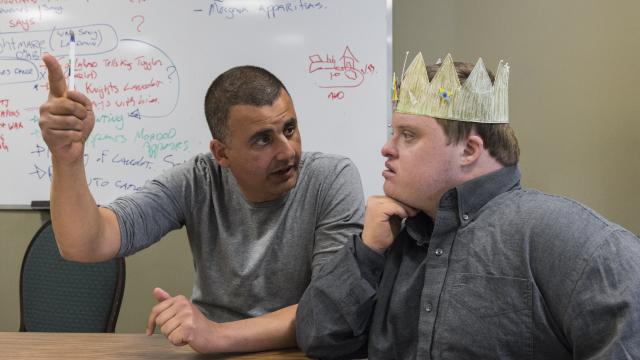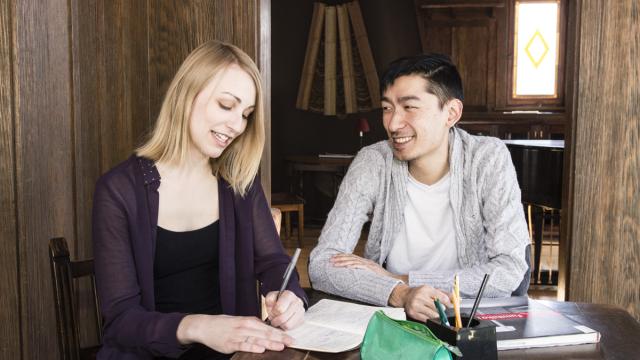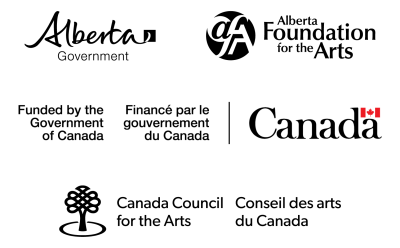Notes From the Lab: Mieko Ouchi

Meiko Ouchi (centre) at the 2016 Banff Playwrights' Colony
I am still buzzing from my 10-day stint at the 2016 Playwrights Lab. I’ve been lucky to attend several times, and each time I am surprised again at what an intense, creative and engaged period of time it is. The hard solo work of writing is the main event of course, but it is beautifully broken up by meals and evenings shared with playwrights and collaborators from coast to coast of Canada, the U.S., China and the U.K. as well as visiting artists from other disciplines. Most of all, it is an incredible chance to connect around and think about the work.
I was lucky this year to share this experience with my collaborator and friend Amena Shehab, who joined me for part of my time at Banff to work on a new piece we are developing. Amena came to Canada as a refugee from Syria via Qatar three years ago. Amena and her three children came to Canada while her husband was given refuge in the U.S. Three years, three months and 27 days later, they were reunited in Edmonton and finally the family is together again.
Amena and I met through a series of careful connections. Because of an amazingly kind teacher at an Edmonton Junior High, her daughter was encouraged to attend a drama camp in Red Deer. On the final sharing day, Amena met some incredible folks from Theatre Alberta, broke down and told them her story. She had been a theatre professional in Syria, before working for Al Jazeera Children’s Channel in Qatar. And despite everything she had been through, she had a piece she desperately wanted to work on. She had written a short treatment in Arabic and had received some assistance from another amazing teacher, her ESL instructor, to translate it. They read it and called me. We met in July of 2015, and Amena showed me what she had written.
It was extraordinary to read. Mariam is the story of a young Syrian woman who is given to ISIS Mujahideen as a sexual slave. After a year in captivity along with her mother, against the odds, she is able to escape and eventually makes her way to Canada as a refugee. After three years in Canada, she makes the painful decision to make a video which she plans to upload to Youtube confronting the person, the religious Mufti, who unbelievably gave her and her mother as a gift to ISIS. Her own Father.
The story Amena imagined is powerful. Moving. And sadly, a glimpse into a situation that is happening right now in Syria. According to best estimates in 2014, more than 3,500 women and girls are being held by ISIS as sexual slaves, some as young as eight years old. Miraculously, a few have escaped with the help of brave men and women who are risking their lives to smuggle them out. While not her own personal story, Amena has drawn on stories from her community and captured something alternately horrifying, harrowing and hopeful. After spending time getting to know each other... and we like to say eating, crying and talking about the story... we decided to work collaboratively on the project. We are co-writing the piece as a one woman show, which Amena will perform and I will direct.
Our process of development as we began it in Edmonton and continued to refine at Banff begins with moments, memories and scenes sparked from the treatment which Amena either writes in Arabic or improvises on her feet in both Arabic and English. While we were at Banff some powerful new silent scenes developed through visual staging ideas we wanted to investigate and physical exploration of the playing space. Other scenes came through image work and even writing prompts that we gave ourselves as starting points. After this initial generation of raw material, we painstakingly translate each new section into English together if it began, as most of them do, in Arabic. Finally, I am shaping the pieces and sequences into a larger dramatic arc, with lots of discussion and input from Amena.
This is an incredibly slow process. And one full of learning on both sides! Amena’s English is vastly improving as is my Arabic. And fascinatingly, we are discovering many words, concepts and even iconic characters and references that do not easily translate from one culture to another, if in some cases... at all. While I think we both expected this, the reality of it has made us deeply consider again the process of translation as so much more than the conversion of words and ideas of one language into another. It forces us to examine what we know as our theatrical traditions.
To think about how stories are told in each of our cultures. To envision how archetypal characters have historically emerged. And required us to consider how this has led us to think of ourselves. Today. And of course in relation to others. To the future. And to the past. And through this intense discussion, I feel like we are gaining deeper insight into our own starting points. And new ideas about the places we can go.
And this feels like the right place for the work to begin.
More than anything else, working on the project has made it crystal clear to both of us, the critical role that theatre can play in telling current, relevant, ongoing stories. Theatre can still be a part of the ongoing conversation, and not merely a recorder of events gone by.
Mieko Ouchi is an Edmonton based playwright, actor, director, and Artistic Director of Concrete Theatre. Amena Shehab is a Syrian refugee and Edmonton based actor, playwright and producer.







